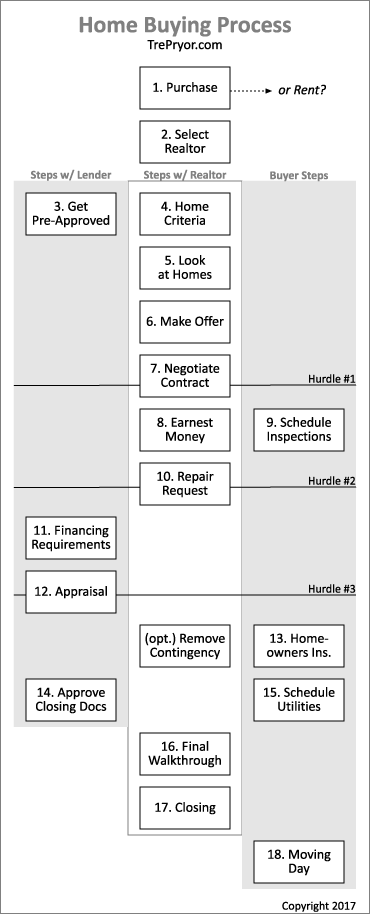If you have never bought a home before, you need to read this article. Or, if you’re just one of these people who want all the facts, our complete home-buying process article should answer any question you might have about buying a piece of residential real estate.

States have different rules. If you live outside of Kentucky some might be slightly different. But, this article covers all of the major steps. It’s not a simple path, and since Dodd-Frank was signed into law in 2010, certain aspects of buying a home have changed. New challenges fell upon lenders but it’s good to be aware of the changes.
Let’s get started!
1. Evaluate Buying vs Renting
Believe it or not, even though I’m a Realtor, there are times I recommend to someone I advise that they should rent rather than buy. It is what is best for them, given their particular situation
How about your situation? What makes the most sense for you?
I wrote Can I Afford to Buy a Home? to help you get the answer to that question. Depending on the variables in your life, you may need to rent an apartment and skip the rest of this article.
2. Select Your Realtor
Nothing will affect your overall experience in the home buying process more than who you select to be your Realtor. Honestly, it’s a pretty big deal. Because like most occupations, there are great ones, average ones, and those who are simply bad at their job.
How to Find the Best Realtor in Louisville is a piece designed to help you do just that. Once you have a high-quality, trustworthy professional on your side, the rest of the items in this home buying process list will be much easier and possibly even enjoyable!

One other point, it never pays to go it alone. Buyers don’t pay commissions. They should always have representation. Also, when building a new construction home, it’s in your best interest to have a Realtor on your team.
3. Get Pre-Approved
Ask your Realtor for their recommendation for loan specialists. The best are those who have been in the business for a good number of years and are familiar with the latest rules and regulations. It also helps if the company they work for has great interest rates or, if they’re a broker, can shop around for the best deal.
It’s smart to get your pre-approval done before you start house hunting. Resist the temptation to shop first. Get your pre-approval first, then you will have an accurate feel for what you can afford before you get attached to a house that’s outside your price range.
4. Target Your Home’s Criteria
Now things start to get fun! After all, that’s why we’re doing all of this… to find a great new place to live.
Your real estate expert will work closely with you laying out the pros and cons of different parts of the city, how search agents work, and even which properties might be better investments than others. Honestly, it’s our area of expertise.
Once you’ve outlined your “must-haves” and other wish list items, it’s time to move to the next step in the home buying process.
Make sure you have your agent set up an automated alert. You want to see the best homes the moment they enter the Louisville real estate market.
5. Looking at Potential Houses
Now let’s look at some homes! If the listing agents are doing their jobs correctly, every home will look brighter, more spacious, and altogether better online than it will in person. Be aware that this is the case before you go out for showings.
It’s rare to find the perfect home on your first trip but it does happen every so often. That’s another reason why getting your pre-approval done before makes sense. Once you find “the one” you are ready to…
6. Make the Offer
…make the offer! Having financing in place means your offer will be stronger than those who were procrastinating. Writing the offer is not nearly as fun as looking at homes but having professional advice throughout makes it far easier. Understand that completing all the paperwork is a necessity—no fun but important.
Your Realtor will find the best comps for this property to determine market value, which is key when writing the offer. There are a number of “tricks of the trade” that can help you get the best, possible price on this property.
7. Negotiate the Deal
It may be simple or it may be an ordeal. It may be something from out of left field. Here’s where experience really pays off. Your Realtor’s expert opinion can be worth, literally thousands of dollars at this point.
Once “accepted” we have crossed the first major hurdle in successfully buying a home.
8. Earnest Money Deposit
Accepted contract? Congrats! Now, you will write an earnest money check to keep the momentum moving. Depending on how things progress from here, you’ll either get this amount as a credit on your closing documents or returned to you after the successful termination of the contract.
9. Schedule Home Inspections
Don’t waste time! Schedule those inspections right away. Start with a great home inspector. Your Realtor may have a list of recommended inspectors but a good Realtor will not push you towards any particular company. Ask your friends if they felt their home inspector did a great job.
Your contract has a time period for any and all inspections. This way, if the home inspector recommends a specialist take a look at something like the HVAC, roof, or another part of the house, you will still have time to get those things inspected as well.
10. Negotiate Repairs with Seller
Once all inspections are complete, get with your Realtor to design the repair request. This is the official document that you will send to the home sellers. In our state, if both parties can’t come to terms on repairs, then the contract is void.
Once repairs are agreed upon, you have crossed the second major hurdle. Now we’re heading forward toward a successful closing.
11. Complete Financing Requirements
There’s not a lot to this step, but I do have an urgent word of caution. Do not make any large purchases during this time. Do not open any new credit cards or do anything to diminish your financial situation.
Before closing, your loan company will want to know that you have the same financial buying power that you had when you got your pre-approval. The rest of these financing requirements are simply giving the loan company everything they need to process your loan.
12. Clear Appraisal
I wouldn’t call this a major hurdle in most deals, but if the appraisal comes back low, then it most certainly is! The loan company wants to make sure the home is valued at, or above, the agreed-upon sales price. In most cases, the professional real estate appraiser is drawn at random from a pool of potential candidates to prevent malfeasance.
In the event of a low appraisal, there’s another set of steps that need to take place that is beyond the scope of this article. Please contact me with any questions.
Remove Contingencies (optional)
If you have a contingency on the sale of another home, then this step in the process needs to be worked through, in order to proceed with the purchase of your new place. If not, no worries, keep right on marching!
13. Obtain Homeowner’s Insurance
Here we have a straightforward and simple step to complete. Ask your Realtor if they have any recommended insurance professionals that should be considered. It always pays to shop around. Especially here, as most do not change their homeowner’s insurance during the entire time they own their house.
14. Approve Closing Docs
This step in the home buying process is quick and easy. Buyers didn’t have to do this in years past. Due to new regulations, buyers must sign off on the closing paperwork 3 days prior to closing. The lender then captures this acceptance in order to move forward.
15. Schedule Utilities In Your Name
Here’s an easy one to forget but don’t let that happen to you. Make sure that your new home has utilities put into your name starting on the date of closing. While you’re at it… schedule your internet or television provider as well!
16. Final Walkthrough
We’re almost there! The purpose of the final walkthrough is to make sure the sellers completed any required repairs and have moved their possessions out of the house without damaging anything. Per the contract, the home’s condition should be the same as it was during the showings.
17. Close on Your New Home
The big day is finally here! Are you nervous? Don’t be, it doesn’t help anyway.
When you close on your new home, you are officially signing all the required documents pertaining to the mortgage, the deed, and other related issues. If you have any questions about anything you are signing, now is the time to ask! Your Realtor should be there with you to help, as well.
18. Moving In!
Time to move your things in. This is actually one of the more challenging steps in the home buying process so make sure to get plenty of friends to help. Here’s a list of must-dos that will help you stay on task.
There you go! The full list of all 18 steps in the home buying process. If you have any specific questions about how things work here in Louisville, I’m always happy to help and would love to be your Realtor.



